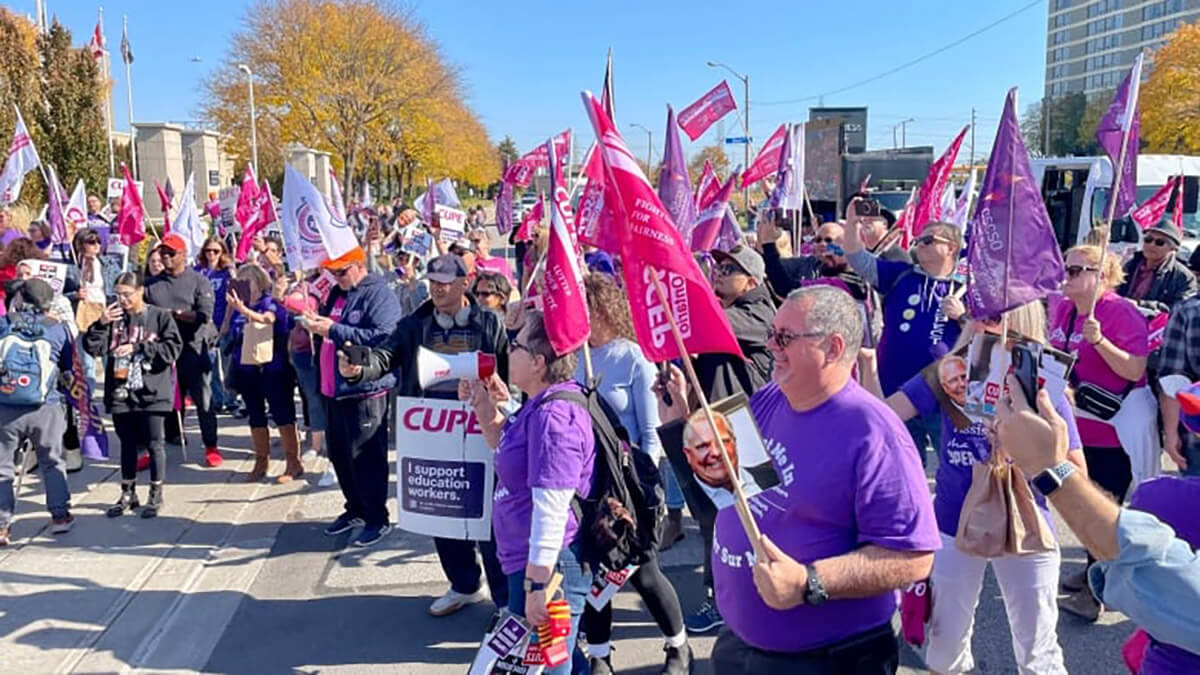“We have shown that attacks on our rights as workers will not be trampled on without a fight” – CUPE Ontario
The Canadian Union of Public Employees (CUPE), representing more than 55,000 education support staff in Ontario, such as administration staff, librarians, early childhood educators and custodians, have been in the spotlight these past weeks not only because they were negotiating their future contracts with the government, but also because of the path these discussions have taken. Not only did they go on strike for two days, despite the legislation that overruled their right to do so, but they also guaranteed the support of other Unions around the province and the country which made the provincial government step back from their first approach.
The two parties have been negotiating for weeks with no success. While CUPE asked for an 11.7% increase in wages and other benefits, the Doug Ford government offered 2.5% annual raises to workers making less than $43,000 and 1.5 per cent raises for all others. After that, both the government and CUPE accused the other side of walking away from the bargaining table and the rest of the history has been widely reported by the press. Doug Ford imposed Bill 28 that contains the notwithstanding clause—Section 33 of the Charter of Rights and Freedoms- that forced a contract onto the province’s education support workers while also making it illegal to take any job action.
The Canadian Union of Public Employees decided to challenge the legislation and walked out for two days, which resulted in school closures all over the province. After that, Ford decided to rescind the law and the parties are back to the negotiating table. For the union it was a victory over the government that imposed this “draconian” legislation over the workers’ rights to strike and bargain. The union considered this a win for the education workers and in this interview with Milénio Stadium, they give their opinion on recent events, explain their demands and wage increases request and emphasize that the guarantee of a decent paycheque to education workers is fundamental to help improving the education system in Ontario as a whole.
Milénio Stadium: CUPE announced it would end the strike after Doug Ford offered to rescind education law. Do you consider this a win for the union?
CUPE: We consider this a win for 55,000 education workers, for the rest of CUPE in Ontario, the entire Canadian labour movement, and allies from every community in the province and across the country. Together, we have shown that attacks on our rights as workers will not be trampled on without a fight.
MS: What’s your opinion about this government tactic in this particular negotiation? Was the use of Bill 28 a mistake?
CUPE: When the Ford Conservatives passed Bill 28, we knew it would undermine our most foundational rights and freedoms. But we also knew that what can be forced through by a government can be reversed by the principled efforts of the people.
MS: Other unions and labour classes have shown solidarity with CUPE during this process. What does that mean?
CUPE: Countless people, organizations, unions, and political parties came together with one voice to say that not only did education workers deserve a significant raise and sustained investments into services, but that Bill 28 was an unprecedented attack on all of us. The solidarity people showed for education workers and for everyone who relies on the Charter most of all has been an incredible experience for all of us that we won’t soon forget.
MS: Do you believe in reaching a fair deal for both sides? The workers and government, at the end of the day, taxpayers?
CUPE: Our work isn’t done until 55,000 education workers in Ontario get a deal that meets the needs of workers, students, and communities.
MS: CUPE started the negotiations by asking for a 11,7% increase in the wages which the government considered too much. Where did you come up with this number?
CUPE: Education workers’ proposals for student success and good jobs initially included a reasonable, necessary, and affordable wage increase of $3.25 per hour to help retain and recruit workers to give children what they need in the classroom and pull workers back from the brink of poverty. The result of attacks on education workers’ wages and collective bargaining rights has been wage settlements from 2012-2021 that equal 8.8% (compounded) while inflation to the end of 2021 totaled 19.5% – meaning education workers have already taken a 10.7% pay cut. With inflation well over 7% in 2022, education workers are fighting to prevent another 17% wage cut.
Lizandra Ongaratto/MS









Redes Sociais - Comentários